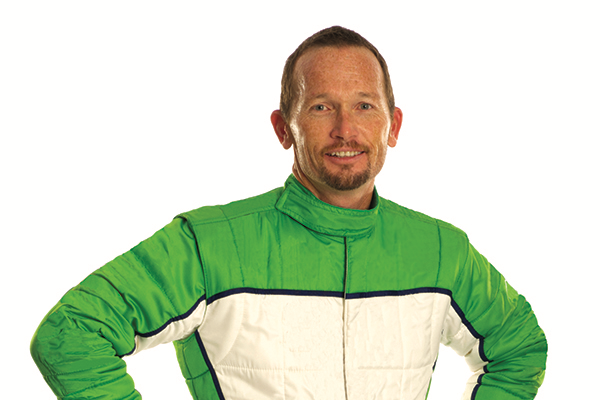World Champion Drag Racer “Fast Jack” Beckman
“Cancer hasn’t taken my drive away.”
by Jessica Webb Errickson
Professional drag racing champion Jack “Fast Jack” Beckman was just seven years old when he went to his first drag race. Immediately he was hooked. “I didn’t even have to see the cars,” Jack tells Coping®. “The first time I heard them when we were walking up to the gate, the smells, the way it shook the ground – it just absolutely hooked every sense of mine.”
After his honorable discharge from the Air Force in 1988, Jack started racing regularly at local tracks. From then on, all of his spare time and money went toward making his car faster.
In 2003, Jack was on the fast track to success, contending for the National Hot Rod Association Super Comp World Championship, when he noticed that he regularly wasn’t feeling well. Maybe it was a lingering cold. Or maybe it was just the stress of the competition, he thought. Either way, his symptoms kept coming back. It wasn’t until Jack went in for an MRI in May 2004 that the real problem was revealed – stage IIIB non-Hodgkin lymphoma.
“I kind of went numb,” Jack says. “I was 37 years old. I worked out four or five days a week. I ate healthy. I didn’t smoke. So it was the last thing on Earth that I expected.”
You’ve got to fall back on your strengths and forget about your weaknesses when you’re going through something like this.
Jack’s burgeoning racing career hung in the balance, but he refused to give up on it. “I was single at the time, and I just lived for my racing,” he explains. “That was absolutely my passion and my love, and I couldn’t imagine having to give that up, even going through cancer.”
Facing an aggressive eight-cycle chemo regimen, Jack says he felt like his head was spinning. “I’m a mechanic, a how-do-you-fix-it guy,” he says, “and I had no idea where to start. I didn’t even know what questions to ask.” It didn’t help that fears about how the treatments would affect his daily life lingered in his mind. “I was being told I wouldn’t be able to race and I wouldn’t be able to work,” he says.
However, when he sat down to talk with his doctor, Jack learned that those preconceived notions about chemotherapy weren’t necessarily accurate. Though his doctor didn’t think it would be a good idea for him to work on cars and risk getting an infection, Jack was still able to continue working as a drag racing instructor, and more important, he was still able to race.
That’s not to say his course of treatment was a breeze. But Jack says, “You’ve got to fall back on your strengths and forget about your weaknesses when you’re going through something like this.”
Jack’s cancer went into remission in October 2004. Since then, he’s achieved more than he could ever have imagined, including winning the 2012 NHRA World Championship in the Funny Car division. “Cancer hasn’t taken my drive away,” he exerts, “I very much am – pardon the pun – driven to be the best that I can be for my team and for the sponsors I drive for.”
He also met his wife, Jenna, who gave him his two “little miracles,” Jason and Layla. “I never thought I was going to be a dad. That was another myth about the chemotherapy,” Jack says. “In some cases, it does render you
sterile. In my case, it didn’t.”
Though Jack’s life has changed since cancer, cancer hasn’t changed Jack. He’s still the same ambitious, speed-loving guy he was 10 years ago. “What cancer did,” he explains, “is it made me a useful tool.”
Understanding the uncertainty that comes with facing chemotherapy, Jack teamed up with pharmaceutical company Amgen on its Chemotherapy: Myths or Facts campaign to help debunk common misconceptions of chemotherapy and encourage people with cancer to speak openly with their doctors to get the facts.
“I go in for my yearly checkups, and I make sure I stay on top of my health,” Jack says, “But from an experience standpoint, I think I can help people who are going through it now.”
And for those people, Jack asserts, “There is hope.”
Learn more about the Chemotherapy: Myths or Facts campaign at ChemoMythsOrFacts.com. “It’ll arm you with the things you need to know,” Jack says. “Then you can go to your oncologist and ask logical, directed questions to get their opinion on what works best for you.”
This article was published in Coping® with Cancer magazine, November/December 2013.


